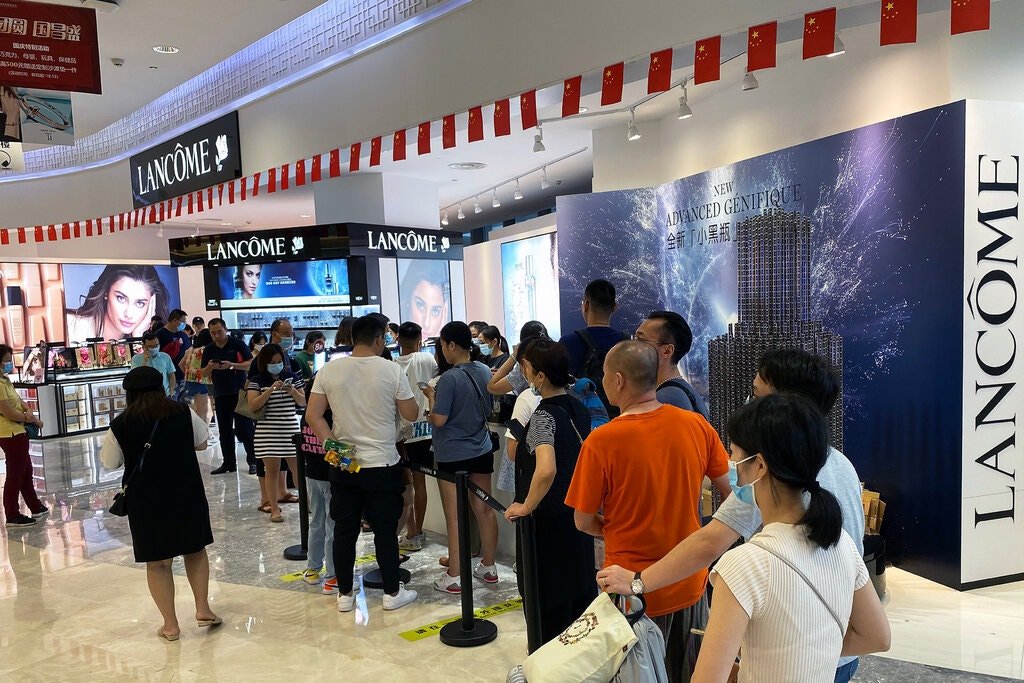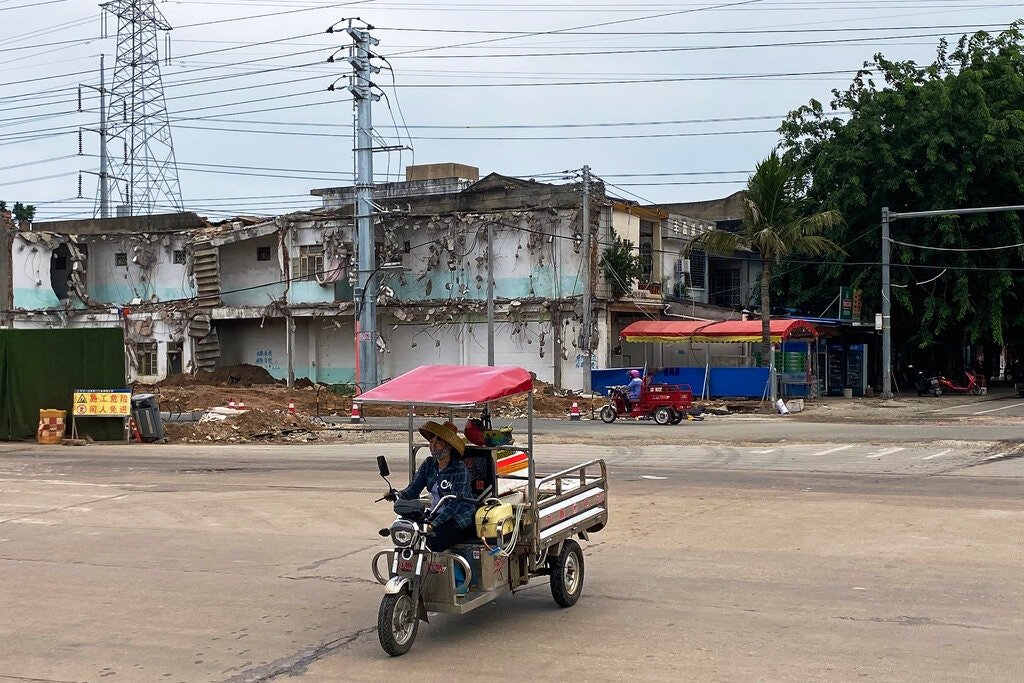
China Envisions a New Hong Kong, Firmly Under Its Control
Low taxes. Duty-free shopping. Sandy beaches. The Communist Party even wants to put people on yachts.
China wants to turn Hainan Province, an island the size of Maryland in the South China Sea, into a free-trade port and international commercial hub. The island, with 9.5 million full-time residents, is offering new incentives to transform the snowbird haven into a destination for global companies, jet-setting financiers and sophisticated shoppers alike.
China already has a place like that: Hong Kong, with 7.5 million people. But the future of the former British colony has been thrown into doubt. After last year’s pro-democracy protests, the Chinese government has brought Hong Kong to heel with a stringent national security law and a crackdown on dissenters. It is not clear whether the events have permanently damaged the longtime bastion of economic liberty.
Transforming Hainan would give China a financial and corporate Plan B. Still, copying Hong Kong will not be easy. Much of Hong Kong’s success comes from its laissez-faire regulation, independent judicial system, unfettered movement of money across its borders and the free exchange of information — liberties all lacking in the mainland.
Beijing has shown little inclination to relax its control in a way that would allow Hainan to fully match Hong Kong. Hainan also lacks Hong Kong’s educated, often worldly work force and Hong Kong’s proximity to China’s Guangdong Province manufacturing belt.
Still, in areas like shopping or luring corporate offices, Hainan is starting to compete.
“You don’t need a visa, it’s easy to get there and the Covid situation may drag on for months or a few years before they fully reopen the border with Hong Kong,” said Jean-Pierre Cabestan, a professor of political science at Hong Kong Baptist University. “What’s happening in Hainan is adding to the sense of marginalization in Hong Kong.”
Chinese officials say they want to complement Hong Kong, not replace it. And in any case, making Hainan a free-trade mecca will not be easy. Over the past few years, at least 21 free-trade zones have been introduced in places like Tianjin, Shanghai and elsewhere. Most never took off.
Efforts specific to Hainan have faltered in the past, too. Local officials have for years looked for a way to further develop the province, which is more famous in China for property booms and busts than for finance or shopping. They have repeatedly explored gambling, only to be told no each time by Beijing.
Local officials say their new campaign is different. Rather than catering to importers and exporters, they have unveiled efforts to appeal to shoppers, the wealthy and even those seeking face-lifts.
“The level of Hainan’s opening up is much greater than the mainland free-trade zones,” said Xia Feng, a professor at Hainan University who studies free-trade areas.
Shopping is a big part. New rules allow anyone from the mainland to buy about $15,000 a year worth of goods on Hainan without paying China’s usual import, sales and luxury taxes. The previous limit was only $5,000.
By contrast, tariffs and other taxes raise the price of imported cosmetics on the mainland by half.
Tourists like Xu Yang, a 33-year-old from Qingdao, have been mobbing Hainan stores for brands like Lancôme, SK-II, La Mer and Dior. Ms. Xu said Estée Lauder liquid makeup foundation costs about one-third less at the duty-free store in the Hainan capital, Haikou, than at home.
That was worth enduring the crowds of shoppers. Tourist visits jumped by nearly two-thirds after the policy changed on July 1 compared with a year ago.
“It’s crazy here, and the line is so long,” Ms. Xu said.

Brands like Tiffany and Prada have opened stores in Haikou in recent weeks to reach Chinese buyers who no longer travel overseas because of the outbreak.
“Shopping in Hainan is more convenient,” said Mary Liu, a Beijing resident, as she browsed Coach handbags in Haikou.
Hainan still lacks Hong Kong’s sheen. It lacks the restaurant options of Hong Kong, Tokyo, Paris and New York. Some of the most haute luxury brands are missing. Kering, the Parisian luxury house, has opened Gucci Sunglasses and Gucci Perfume stores in the Hainan beach city of Sanya but not shops for its elite Ulysse Nardin and Girard-Perregaux watches. Kering declined to comment.
“You can imagine what shopping atmosphere there is,” said Rachel Qian, a 33-year-old Shanghai resident who took frequent shopping trips to Tokyo before the pandemic. She is giving Hainan a pass to avoid rubbing elbows with people who will buy premium brands only to sell them elsewhere in China.
“People are not there for the fun of shopping but to make money,” she said.
In skills, too, officials are trying to overcome Hainan’s deficiencies. The central government has dispatched to the province experienced officials who have overseen successful development programs. Hainan’s governor, Shen Xiaoming, previously ran Shanghai’s free-trade zone and helped persuade Tesla to set up its first overseas car assembly plant there.
To draw skilled workers, the Hainan government bought private preschools all over the island last spring and made them public, with preferential enrollment for the children of well-educated parents who move there.
“There will be more and more high-end talent in the future,” predicted Yu Lei, a telecommunications engineer who has moved there from the city of Chongqing and has just enrolled his 3-year-old daughter in a newly public preschool.
To lure companies and the rich, Hainan officials have slashed taxes. They have cut personal and corporate taxes for some to 15 percent. In mainland China, high-earning individuals face a steep 45 percent income tax rate, while a wide range of corporations pay 25 percent.
Some wealthy individuals have rushed to set up personal companies on the island to route part of their paychecks through there and save on taxes, say those who work with them. Similarly, Chinese companies are exploring setting up subsidiaries there.
“I persuaded my customers to go there to register companies,” said Kevin Shi, a banker in Shenzhen, across the Chinese border from Hong Kong. “They are exploring how they can benefit there, and there are discussions with the government on what they can do, what they can get.”
Hainan officials hope low taxes will attract new types of business. For example, hospitals and cosmetic surgery offices could use Hainan to lure well-heeled patients who might seek residency while they recuperate. Hong Kong, with its advanced medical care, currently plays this role.
Mr. Shi said that he had taken executives from hospitals and other health care businesses to Hainan in September. A team from the European Union Chamber of Commerce in Beijing that visited the island in late September concluded that affluent Chinese may start going to Hainan instead of Hong Kong, Thailand or Europe.
Still, building Hainan as a low-tax, low-regulation haven will be a tough task. Other provinces may come to resent its low taxes and other perks and prompt the central government to push back.

Beijing is not about to give up control. In recent months, even as Hainan officials laid out their plans for the island, Beijing officials pledged to keep in place strict limits on money movement and other restrictions on daily life.
That includes some lingering tariffs. Mr. Shen, the island’s governor, said at a news conference in June that someone buying a $1.4 million yacht could save more than $500,000 in tariffs and taxes.
Zou Jiayi, a Chinese vice finance minister, threw cold water on that idea within minutes at the same event. Imported cars, buses and yachts are exempt from tariffs only if used for tourist businesses, she said.
And unlike other goods, they may not be taken back to the mainland.











